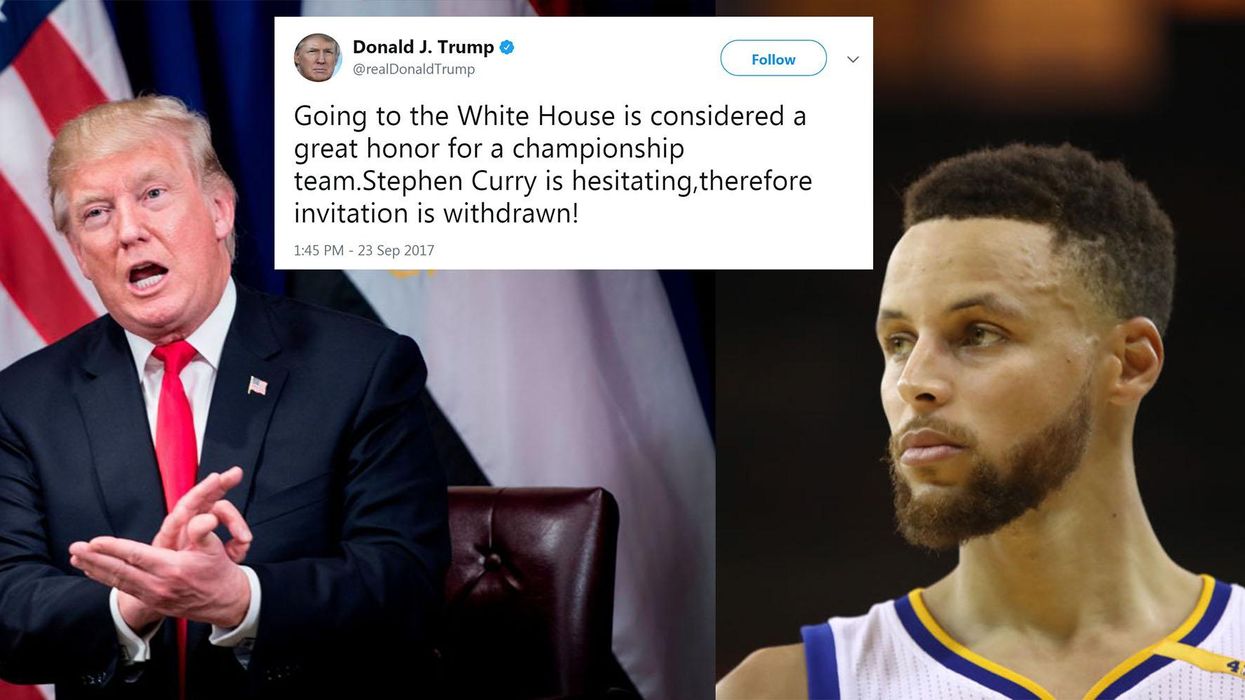Greg Evans
Sep 24, 2017

Picture:
Getty Images/Twitter
United States President Donald Trump decided to controversially rescind an invite to NBA champions, Golden State Warriors, due to protests from one of their top players.
Stephen 'Steph' Curry, a two-time NBA MVP, said on Friday that he wouldn't be visiting the White House, a sentiment he has held since June.
It has been tradition for American sports teams to visit the White House since 1865, when Andrew Johnson invited the amateur baseball clubs the Brooklyn Atlantics and Washington Nationals to the capital.
The first NBA champions to visit the famous building were the Boston Celtics in 1963, with John F. Kennedy extending the invite.
It wasn't until the Reagan administration that the visit of sports teams to Pennsylvania Avenue became a regular occurrence, which has also been extended to college football and ice hockey champions.
However, due to the nature of Curry's refusal to visit the White House and the President, Trump has withdrawn the invitation, personally attacking the athlete on Twitter.
It is unclear if Trump has withdrawn just Curry's invite or the entire team.
Regardless the Warriors have responded in a statement expressing their disappointment.
Curry has also responded by stating that:
I have an idea of why [he withdrew the invite], but, it's just kind of beneath, I think, a leader of a country to go that route.
It's not what leaders do.
Trump continued to criticise other sports stars on Twitter, later aiming his attack at NFL players who have chosen to kneel in an act of protest during the American national anthem before games.
This show of defiance was started by former 49ers quarterback Colin Kaepernick and has been adopted by other high profile names, even outside of sports, such as Stevie Wonder.
Although the two are not related, this series of incidents has further highlighted Trump's willingness to speak out against those that defy him, rather than criticise controversial groups that side with him.
Just last month, huge numbers of far-right neo-Nazis descended onto the town of Charlottesville, Virginia to protest the removal of a statue of a pro-slavery Civil War general.
Violence soon broke out between the white supremacists and anti-fascist protestors, which lead to the death of a woman who was hit by a car, driven by a suspected white supremacist.
In the wake of the incident, rather than condemn the fascists, Trump said:
We are closely following the terrible events unfolding in Charlottesville, Virginia.
We condemn in the strongest possible terms this egregious display of hatred, bigotry and violence on many sides, on many sides.
Although he would later reiterate his criticism of the fascist groups, he would then go back on his word during an impromptu press conference at Trump Tower.
Trump's polarising views and readiness to criticise athletes quicker than Nazis was perfectly summed up in this tweet from Michael Skolnik.
HT Yahoo, The Hill, The Guardian, Twitter
More: 7 things Donald Trump condemned faster than white supremacism
Top 100
The Conversation (0)













